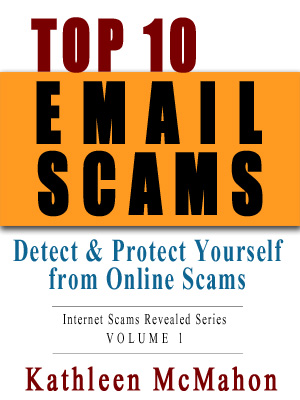Top 10 Email Scams
Free Sample Excerpt from Book:
Sometimes it feels like me against the enormous invisible endless sea of Internet scammers. I know this is not true. I know I am not alone. But sometimes it feels that way.
Internet scammers came into my life really at the very beginning of the Internet. I was on the band wagon from the first day. In fact, I was the first woman SYSOP in California on a system that pre-dated the Internet, called rBBSnet. It was kind of a store-and-forward system for email. We thought it was lightning fast at the time. I laugh about it now. Good times. But not so fast times by any means.
As someone who has had a technical life since 1983, it was natural that people would turn to me when the Internet days took off, like so many fireworks, to figure out if the emails they were getting were for "real". It took a while for the scammers to really get with the idea that the Internet was going to be their new frontier, but once they did, it was like cockroaches entering a whole new dreamy yummy environment - and to one degree or another, they were never going to leave ever again. They are adaptable buggers.
I've been happy to help people figure out scam emails - in "guestbooks" in the early days, on AOL chat rooms (oh, how I date myself!), in forum message boards. Then one day not that long ago, I got 5 emails in one day from fellow artists who had all lost between $1000-$5000 each to scammers, writing to me too late, and it hit me all at one time - how many emails had I received over the years? 5,000? 10,000? more?
I realized it was time to do something on a larger scale.
The authorities weren't going to do anything. Scammers love to stay under the radar and in countries where it is hard to prosecute them. I knew that scammers were using the Internet to pretty much get a huge number of victims for literally no cost (quite an improvement over the old days of actually having to send some kind of mailer through the postal system or make an actual phone call). So I decided I would use the Internet as they do, by bringing their emails, their activities, and the nature of their scams out into the light - post them publicly, get others to post what they receive, have it all show up in search results. Then people just need to learn to search online BEFORE sending any money to anyone, or giving up personal financial information or passwords. That's the plan. The Anti-Scam Samurai Plan. Slash them with light.
And so my life as an Anti-Scam Samurai began. I encourage people online and we post everything we can. I started by helping friends, clients, and artists - they are my "people", but a scam is a scam is a scam and scammers don't really care who they target, so my efforts have expanded beyond helping artists.
At first, I began a list of scammer names and email addresses on my art website. Scammers fake all their names and use disposable email addresses but I still wanted to make this list so it would show up in search results if someone was searching on it, and confirm for that user that it was indeed a scam. I wanted more interactivity, so I started a blog, called Stop Art Scams (stopartscams.blogspot.com). I post scams that people send me and everyone jumps in on the comments and share their experiences related to that scam. It all shows up in search results. It really has helped a lot of people avoid becoming scam victims. I felt good about that but not so great about continuing to receive emails from people who had actually lost money to scammers. So next I opened a page, also called Stop Art Scams, on Facebook (http://www.facebook.com/pages/Stop-Art-Scams/135887239769963). Even more scam information shows up in search results. Yea! Even though it says Stop Art Scams, we really do welcome all Internet scam posts to share.
And now I realized I really *do* need to expand beyond helping artists and reach even more people. I want to make the life of an Internet scammer as difficult as possible. So now I've written a series of books to spread the word to more people and hopefully continue to reduce the number of scam victims.
The first book in the series, Volume 1, is called Top 10 Email Scams. It describes each scam, how they work, how to recognize them, and how to avoid them. It also provides information on what to do if you do become a victim, and how to deal with (and avoid) identity theft. The second volume covers the scams that are prevalent on the social media platforms, such as Craigslist, eBay, Facebook, Twitter, etc. Volume 2 is called Social Media Scams. There are more than 10 email scams to cover, so I created an additional volume of more email scams important to understand and avoid. Volume 3 is called More Email Scams. And I'm currently working on Volume 4, while I work to release Volumes 1-3. The whole series is called Internet Scams Revealed.
To support the book series and provide an additional space to share scam experiences, there is another Blog (KTMObooks.com/blog/), another Facebook page (facebook.com/KTMObooks), and a Twitter account (twitter.com/KTMObooks). I'm going to cast the information net far and wide. My goal is to educate, educate, educate, and see if all of these efforts will have a growing impact on lowering the number of people finding themselves victim to Internet scams.
Take out your swords. Let's continue to make Internet scammers scramble and work harder at their crimes. Let's shine a light on them. Welcome to the battle.
- Kathleen
